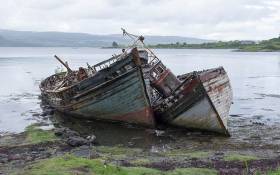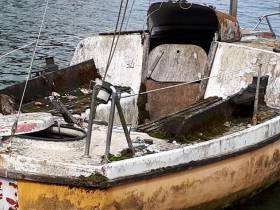Displaying items by tag: Abandoned Boats
Canadian boat owners could be liable to fines of up to €4 million under new legislation to tackle the scourge of abandoned vessels on the country’s coastlines, particularly in the western province of British Columbia.
International Boat Industry reports that the Wrecked, Abandoned or Hazardous Vessels Act sets a prohibition on abandoning vessels while increasing owner responsibility for problem boats — and giving the Canadian government new powers to remove them.
Authorities in Ireland have similar powers under the Canal Act 1986 (Bye-Laws) 1988 to remove from inland waterways any non-permitted vessels, non-attended and apparently abandoned vessels, boats that are double-moored or causing an obstruction, or vessels deemed to be/likely to cause a hazard to navigation.
The new Canadian law can levy “penalties of up to $50,000 (CAD) for individuals and $250,000 for companies or corporations, while regulatory offence prosecution could result in a maximum fine of $1m for individuals and $6m for companies or corporations.”
It comes as part of a National Strategy to Address Canada’s Wrecked and Abandoned Vessels, which has included funding programmes to support coastal communities in the removal of smaller derelict vessels blighting their localities.
International Boat Industry has more on the story HERE.
Abandoned Boats: What is it that Makes Owners Abandon Their Boats?
I don’t mean abandon in emergency at sea, I mean leave them to rot away in boatyards or on rivers or harbour moorings or in boatyards .. to ignore them …. deliberately forget about them …perhaps hoping never to be bothered with them again?
I am finding it hard to understand how anyone who owned and sailed a yacht, can just leave it and never go back, but I’ve been noticing them more in different parts of the country.
There are corners of every boatyard, as far as I can ascertain, where boats are moved as the location of last resort…. Boats that owners don’t or won’t admit to, maybe they can’t afford to pay for them any longer … but the plastic boats of today, as we heard in a recent podcast from that great afficionado of boats, Hal Sisk, will last for … well… no one really knows how long they will last….
There may be and could be reasons, which I discuss in this week’s podcast, but I just can’t understand why people go through all the challenge and difficulty of owning a boat and then abandon it … Boats have been abandoned in yards or on moorings – where, ofen amazingly, ropes still hold them in position after being long-neglected …..
Listen to the podcast here:
Tom MacSweeney presents the maritime programme, THIS ISLAND NATION

























































